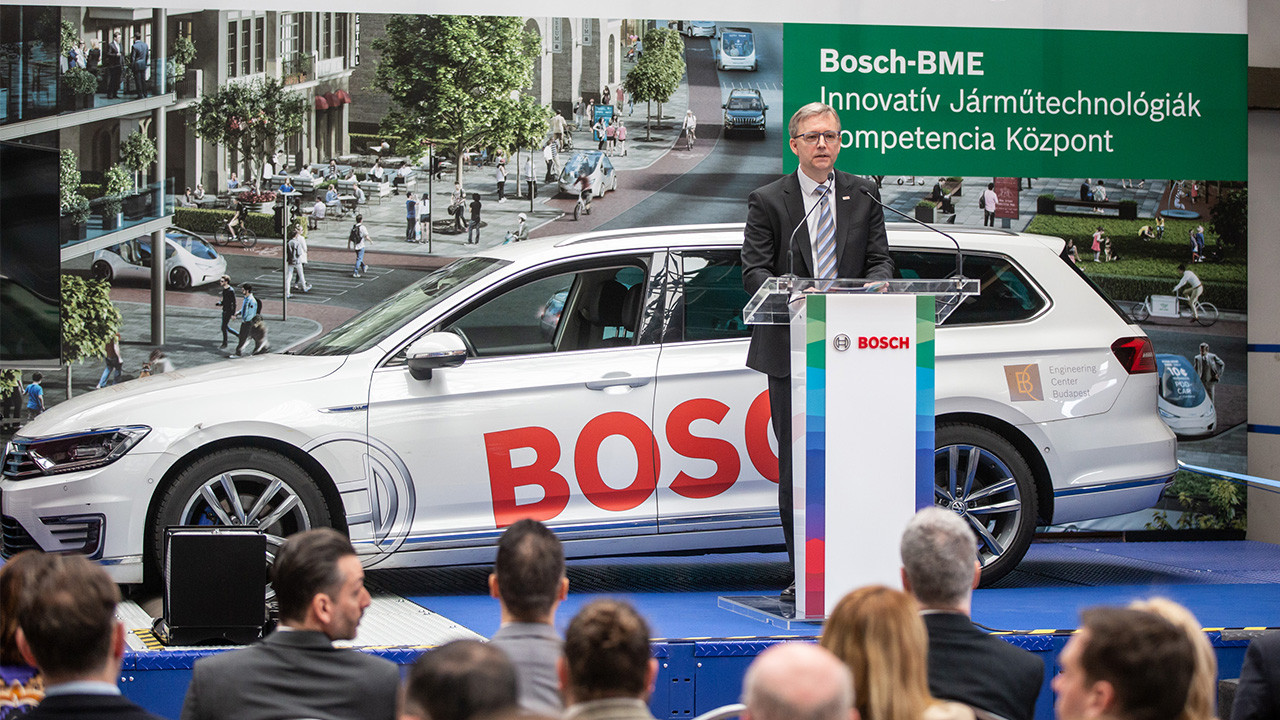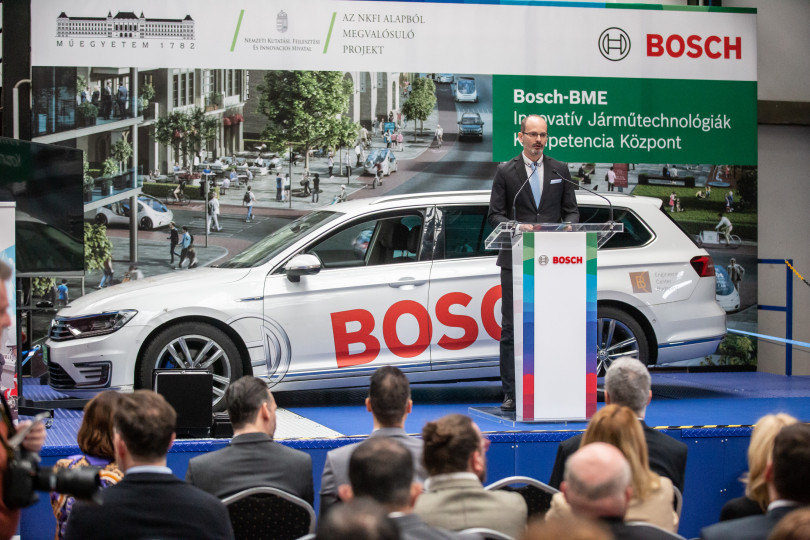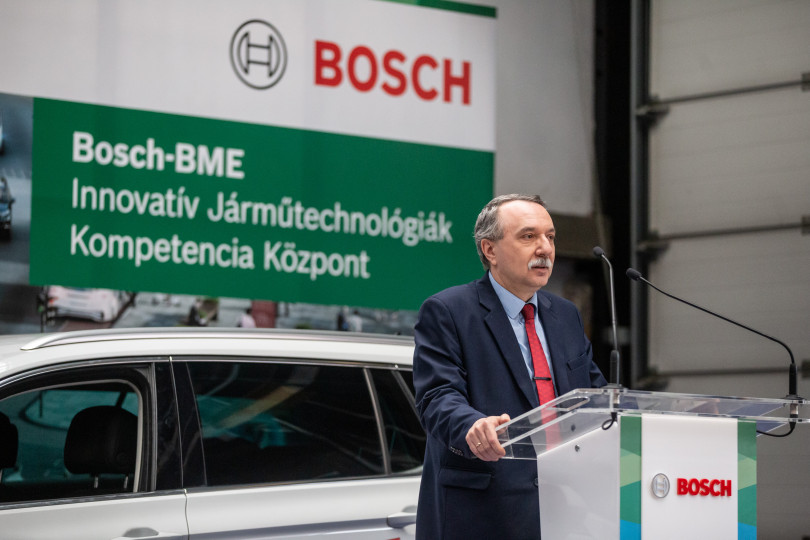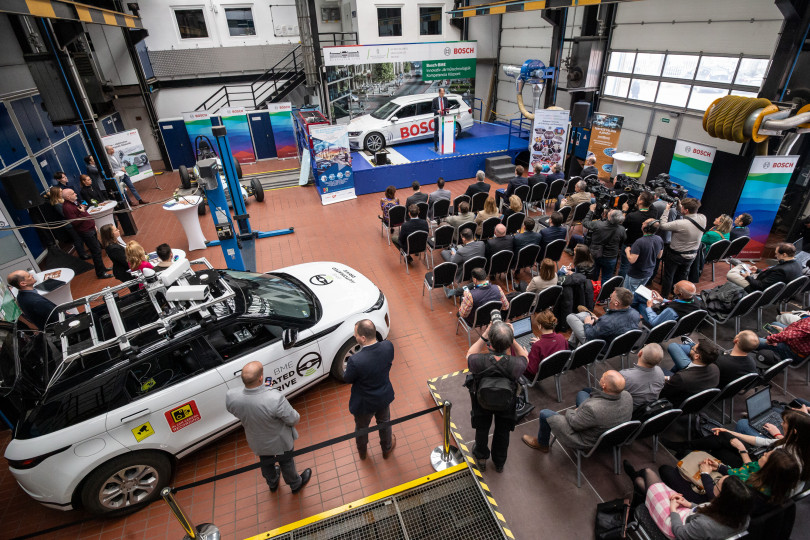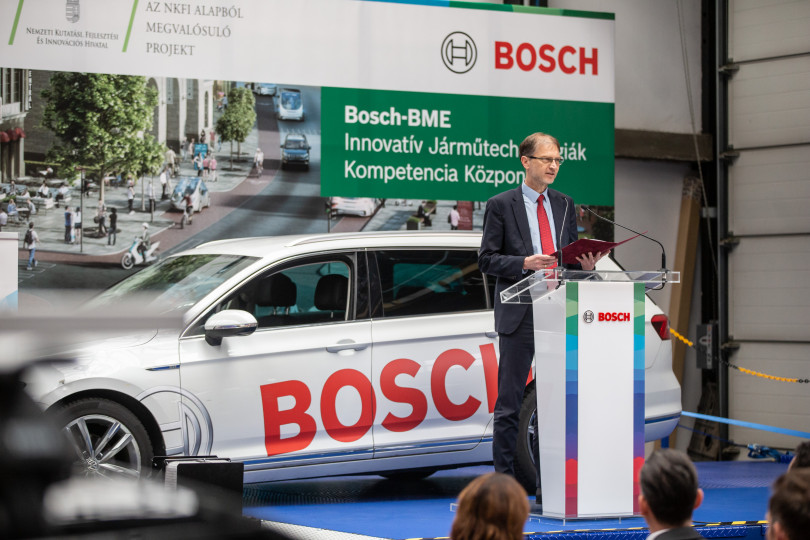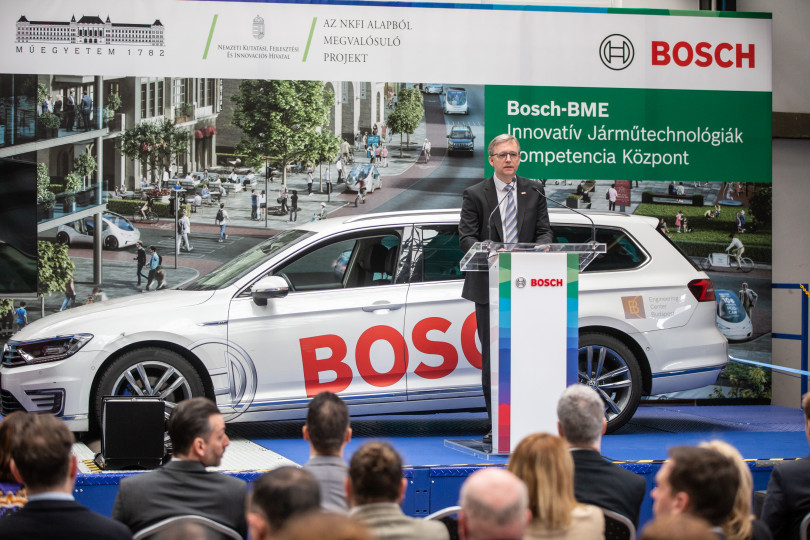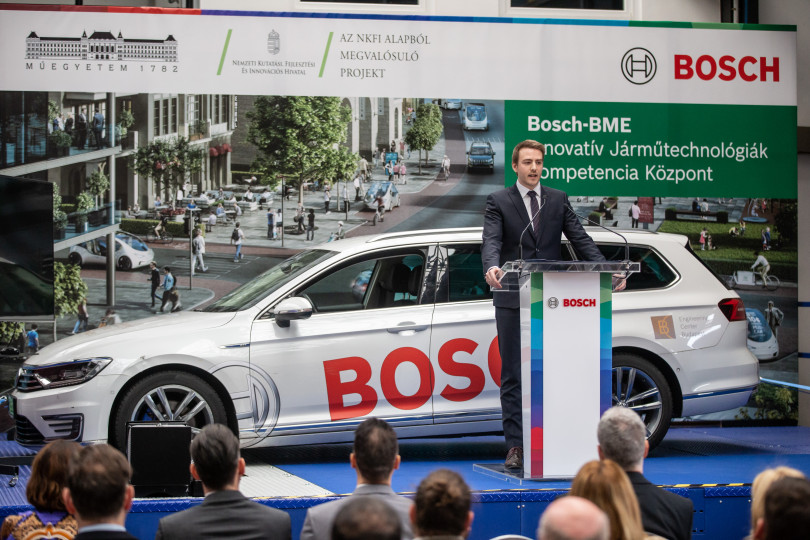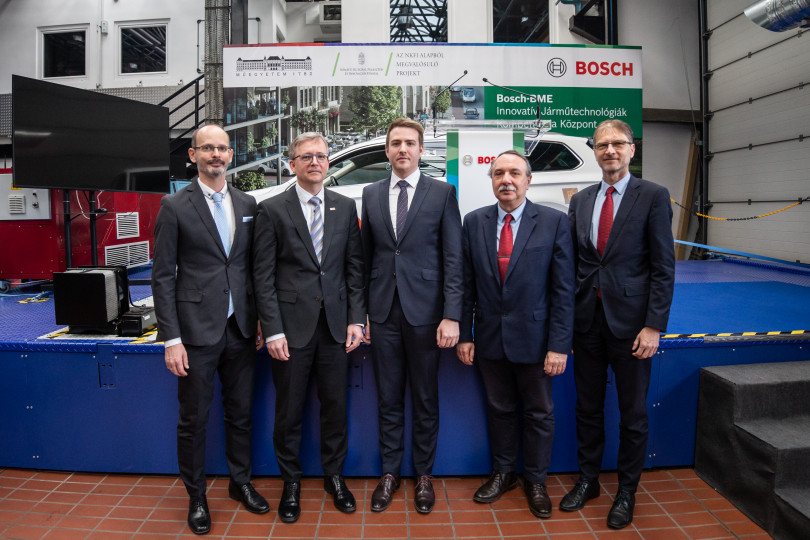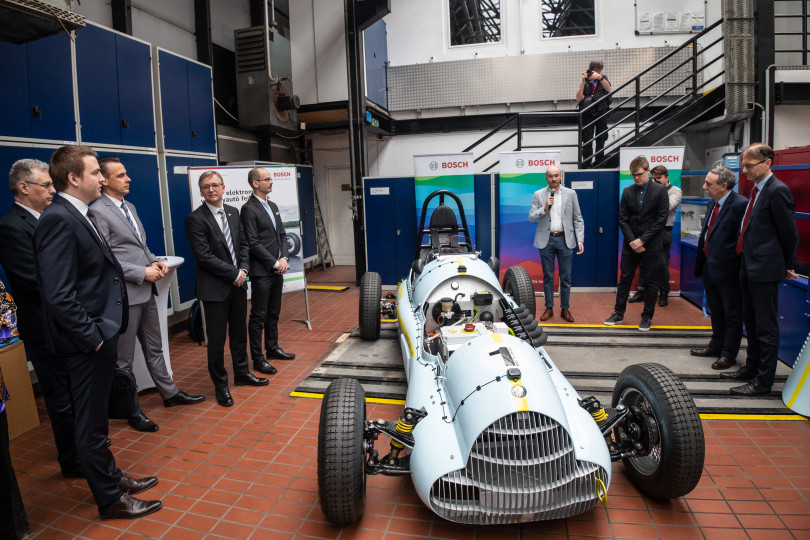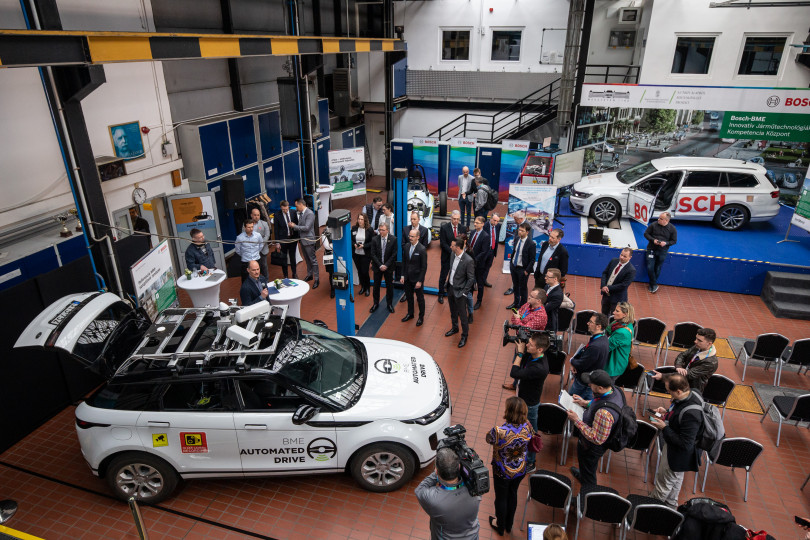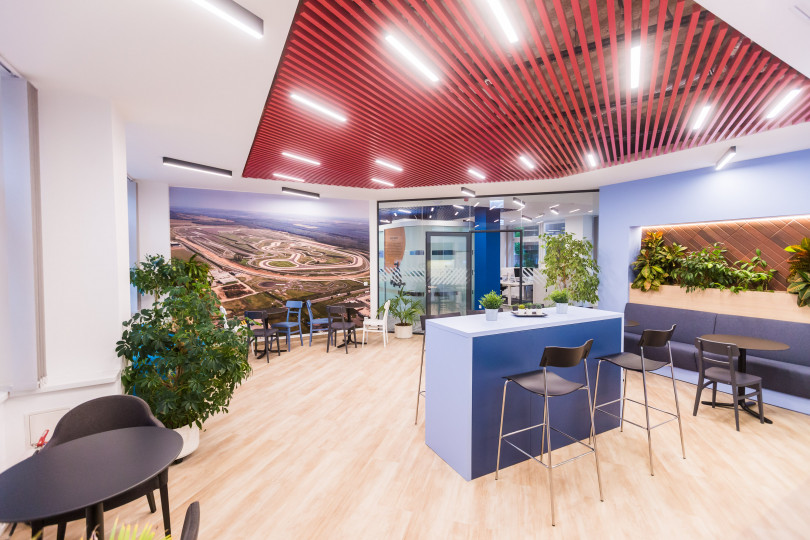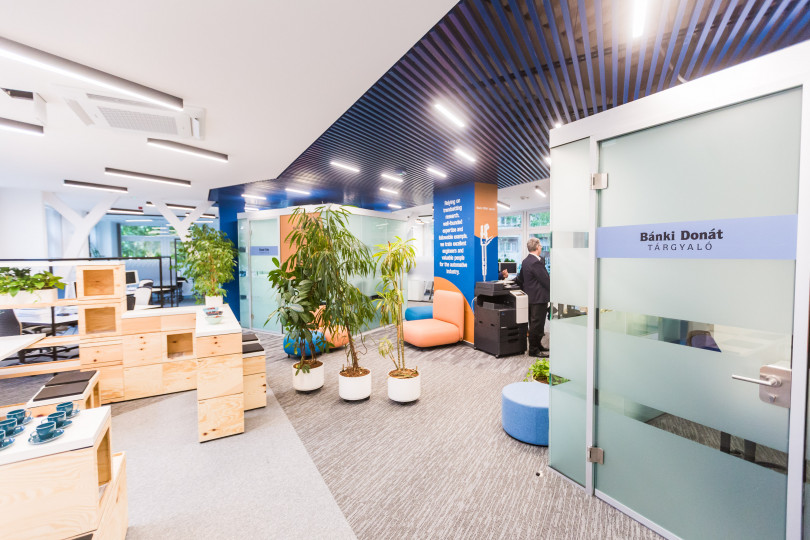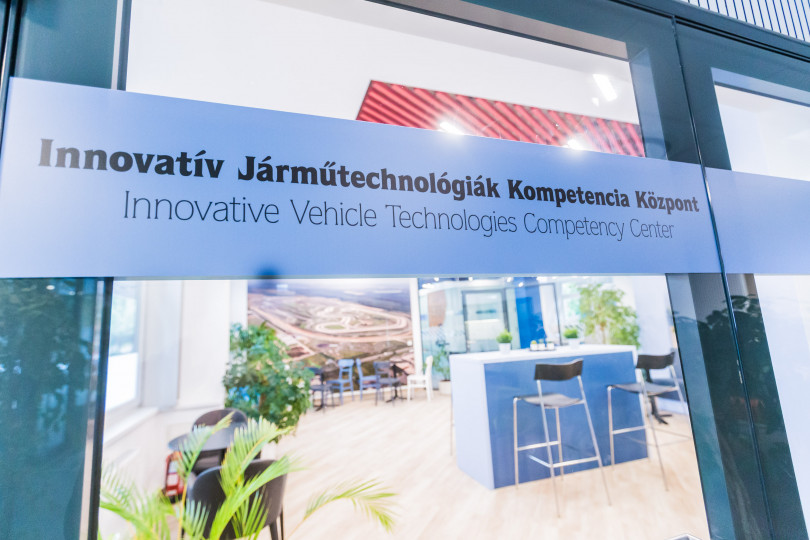Budapest, 29 March 2023 – The Competence Center for Innovative Vehicle Technologies, part of Bosch’s innovation ecosystem, was inaugurated at the Faculty of Transport Engineering and Vehicle Engineering (KJK) of the Budapest University of Technology and Economics (BME) in the capital of Hungary. The tools and simulation systems of the new center are unique in Hungarian higher technical education. They help students to acquire up-to-date practical knowledge in addition to theory, in line with domestic and international industry trends and needs. The development on the campus provides a modern space to support the professional work of both teachers and researchers, and contributes to the cutting-edge training for 60-80 university students per year, connected to the courses of the university.
A key role in engineering education and developing the technologies of the future
The Bosch Group in Hungary has been working with the Budapest University of Technology and Economics for almost 15 years, and the newly inaugurated competence center is another milestone on their journey together. The new competence center aims to implement research and development projects that serve the future of electromobility and can be transferred into innovative industrial practice.
“Part of Bosch's long-term strategy is to strengthen the link between higher education, industrial research and development by building a unique innovation ecosystem. For us, it is important to participate in shaping the innovation industry in cooperation with the academic sector and to contribute as an active partner to the training of the new generation of engineers. We believe that together, we can make even more effective progress in solving the challenges of the future,” said András Kemler, managing director of technical areas, and location manager at Robert Bosch Kft.
Longer range, optimal operation: the goal is to improve electric vehicles
The Competence Center for Innovative Vehicle Technologies focuses on the development of powertrains for electric vehicles. In the new center, BME and Bosch experts will work in a simulation and testing environment where they will be able to model the electric powertrain and its components more accurately than ever before and, as a result of joint R&D work, optimize the operation of electric vehicles even further. The aim is to improve the efficiency of electric powertrains, increase ranges and make available battery capacity and energy consumption more predictable, making charging needs and getting to the destination more predictable.
“Active and multi-level cooperation with leading industrial companies is one of the keys to training engineers who can solve real challenges. Through industrial research assignments, academics engage with students and engineers in answering research questions and first-hand experience is transferred through education,” emphasized Dr. Máté Zöldy DSc., Head of the BME MSc Vehicle Engineering Committee.
Inspiring collaborative spaces for education and research
As part of the collaboration between Bosch and BME, a new 350 square meter office space with a modern approach to education and research has been built in the competence center. The state-of-the-art collaborative space was designed in line with the New Way of Working concept introduced by Bosch. An open office layout, “house-in-house” meeting rooms, a soundproof library room for contemplation, and a “work café” that functions as a community, dining and collaboration space were created. The aim was to create an inspiring working environment and layout that enhances the efficiency of individual and group work and supports collaboration.
The Competence Center for Innovative Vehicle Technologies was implemented within the framework of the project “2019-1.3.1-KK-2019-00004” supported by the National Research, Development and Innovation Office (NRDI) Fund.
Back to the future: from historic racing car to electric test vehicle
As one of the special R&D projects of the new competence center, a classically styled test car will incorporate the latest technologies of today. The components of the electric powertrain of the special test vehicle will be interchangeable in a modular way and will be tested in real operation. Thus, the he various electrical components will be more accurately measured, and the operation, thermal characteristics and range of the powertrain will be optimized.
Digital data collection will take place not only on the chassis dynamometer of the new competence center test lab, but also under real conditions on the ZalaZone test track and even at one of the world’s most famous international vintage motor racing events, where the old-new wonder will contribute to the development of future electric motoring, and the optimization of Bosch components and systems, with continuous measurement data.
Zita Hella Varga
Phone: +36 70 667-6374
Bosch has been present in Hungary since 1898 with its products. After its re-establishment as a regional trading company in 1991, Bosch has grown into one of Hungary’s largest foreign industrial employers with currently eight subsidiaries. In fiscal 2021 it had total net sales of 1,711 billion forints and consolidated sales to third parties on the Hungarian market of 273 billion forints. The Bosch Group in Hungary employs more than 17,000 associates (as of December 31, 2021). Figures of fiscal 2022 for the Bosch Group in Hungary will be available from May 25, 2023. In addition to its manufacturing, commercial and development business, Bosch has a network of sales and service operations that covers the entire country.
The Bosch Group is a leading global supplier of technology and services. It employs roughly 420,000 associates worldwide (as of December 31, 2022). According to preliminary figures, the company generated sales of 88.4 billion euros in 2022. Its operations are divided into four business sectors: Mobility Solutions, Industrial Technology, Consumer Goods, and Energy and Building Technology. As a leading IoT provider, Bosch offers innovative solutions for smart homes, Industry 4.0, and connected mobility. Bosch is pursuing a vision of mobility that is sustainable, safe, and exciting. It uses its expertise in sensor technology, software, and services, as well as its own IoT cloud, to offer its customers connected, cross-domain solutions from a single source. The Bosch Group’s strategic objective is to facilitate connected living with products and solutions that either contain artificial intelligence (AI) or have been developed or manufactured with its help. Bosch improves quality of life worldwide with products and services that are innovative and spark enthusiasm. In short, Bosch creates technology that is “Invented for life.” The Bosch Group comprises Robert Bosch GmbH and its roughly 440 subsidiary and regional companies in some 60 countries. Including sales and service partners, Bosch’s global manufacturing, engineering, and sales network covers nearly every country in the world. With its more than 400 locations worldwide, the Bosch Group has been carbon neutral since the first quarter of 2020. The basis for the company’s future growth is its innovative strength. At 128 locations across the globe, Bosch employs some 85,000 associates in research and development, of which more than 44,000 are software engineers.
The company was set up in Stuttgart in 1886 by Robert Bosch (1861–1942) as “Workshop for Precision Mechanics and Electrical Engineering.” The special ownership structure of Robert Bosch GmbH guarantees the entrepreneurial freedom of the Bosch Group, making it possible for the company to plan over the long term and to undertake significant upfront investments in the safeguarding of its future. Ninety-four percent of the share capital of Robert Bosch GmbH is held by Robert Bosch Stiftung GmbH, a charitable foundation. The remaining shares are held by Robert Bosch GmbH and by a corporation owned by the Bosch family. The majority of voting rights are held by Robert Bosch Industrietreuhand KG, an industrial trust. The entrepreneurial ownership functions are carried out by the trust.
Additional information is available online at www.bosch.hu, iot.boschblog.hu, www.bosch.com, www.iot.bosch.com, www.bosch-press.com, www.twitter.com/BoschPresse

